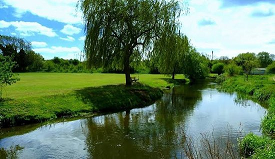The sixth Planetary Boundary to consider is Fresh Water.
In Planetary Boundaries: Exploring the Safe Operating Space for Humanity, Johan Rockström proposes a limit for global freshwater consumption of no more than 4000 km3 yr-1 [1].
In 2009, with a global population 6.84bn, consumption had reached 2600 km3 yr-1 (about 1000 litres per person per day), scarce in many areas, and expected to pass the boundary between 2030 and 2050.
As for the previous boundaries, a plant-based diet appears to be close to becoming a vital and necessary condition to keep within this boundary for a habitable world.
Here’s why.
There are many sources of fresh water – glaciers, lakes, reservoirs, ponds, rivers, wetlands, underground aquifers, or even a well placed water butt.
But currently about 40% of the global population is facing a shortage of water, and some areas are currently surviving only because water is being drawn unsustainably from the local water table – effectively borrowing from the future.
Where I live in Hertfordshire, water companies supply an average of 170 litres per person per day. But that is not the whole story; in addition to this, three thousand litres of water is needed to produce the food the average British person eats every day (meat-free-diets-footprint [2] ). Over 40% of this food is imported.
Agriculture accounts for 92% of the freshwater footprint of humanity; almost one third relates to animal products [3]
In contrast, for example, in the semi-arid regions of Kenya, the nearest water source is an average 50 minute round trip by foot, limiting water access to 17 litres per capita per day [4].
These regions in Kenya are currently experiencing an intense drought, and climate change is predicted to make droughts in that area more frequent.
Two-thirds of Earth’s land is on pace to lose water as the climate warms [5]
Southern Madagascar recently experienced its worst drought in four decades with thousands already in catastrophic conditions and more than 1.14 million people food insecure after four consecutive years of drought have wiped out harvests. World Food Programme Executive Director David Beasley explained “this is not because of war or conflict, this is because of climate change”.
Climate change caused by increasing atmospheric levels of CO2 is also melting glaciers, putting 1.9 billion people at risk because they are directly dependent on the melt water from the glaciers and mountain ‘water towers’ [6]
Clearly our lifestyle affects not only our own fresh water supply but by emitting CO2 or by taking water from other parts of the world in the form of imports we reduce the availability of water for people in some of the most vulnerable areas in the world.
How can we change our lifestyle to reduce the impact on water availability?
One route is to take up a plant-based diet. It takes 3 to 5 times more water to feed a meat eater compared with that used to feed a vegan [7].
It seems to me that the water and carbon footprints of meat products are so large that it is reasonable for everyone to take this step either wholly or in a significant part of their diet.
“Nothing really compares to beef, lamb, pork, and dairy – these products are in a league of their own in the level of damage they typically do to the environment, on almost every environmental issue we track,” says Joseph Poore, a researcher at the University of Oxford
But it needs to be noted that some fruits and nuts are still not good in this respect, and should only be grown where there is a sustainable supply of water : for example, cashew nuts, almonds and walnuts are some of the most water-intensive large-scale crops grown on the planet.
Poore estimates that between them, tree nuts consume 4,134 litres (909 gallons) of fresh water for every kg of shelled nuts that we purchase. And Avocados are not always green [8].
This doesn’t mean that there is no value in a plant-based diet, but that even when following it, it is still helpful to find out about the sources of the food we consume.
References
[1] https://www.ecologyandsociety.org/vol14/iss2/art32
[2] https://www.phys.org/news/2018-09-meat-free-diets-footprint-scientists.amp
[3] https://www.sciencedirect.com/science/article/pii/S2212371713000024
[4] https://www.inderscience.com/info/inarticle.php?artid=65794
[5] https://theconversation.com/two-thirds-of-earths-land-is-on-pace-to-lose-water-as-the-climate-warms-thats-a-problem-for-people-crops-and-forests-151984
[6] https://theconversation.com/the-worlds-mountain-water-towers-are-melting-putting-1-9-billion-people-at-risk-128501
[7] https://www.livekindly.co/vegan-diet-less-water-than-meat/amp
[8] https://www.bbc.com/future/article/20200211-why-the-vegan-diet-is-not-always-green
